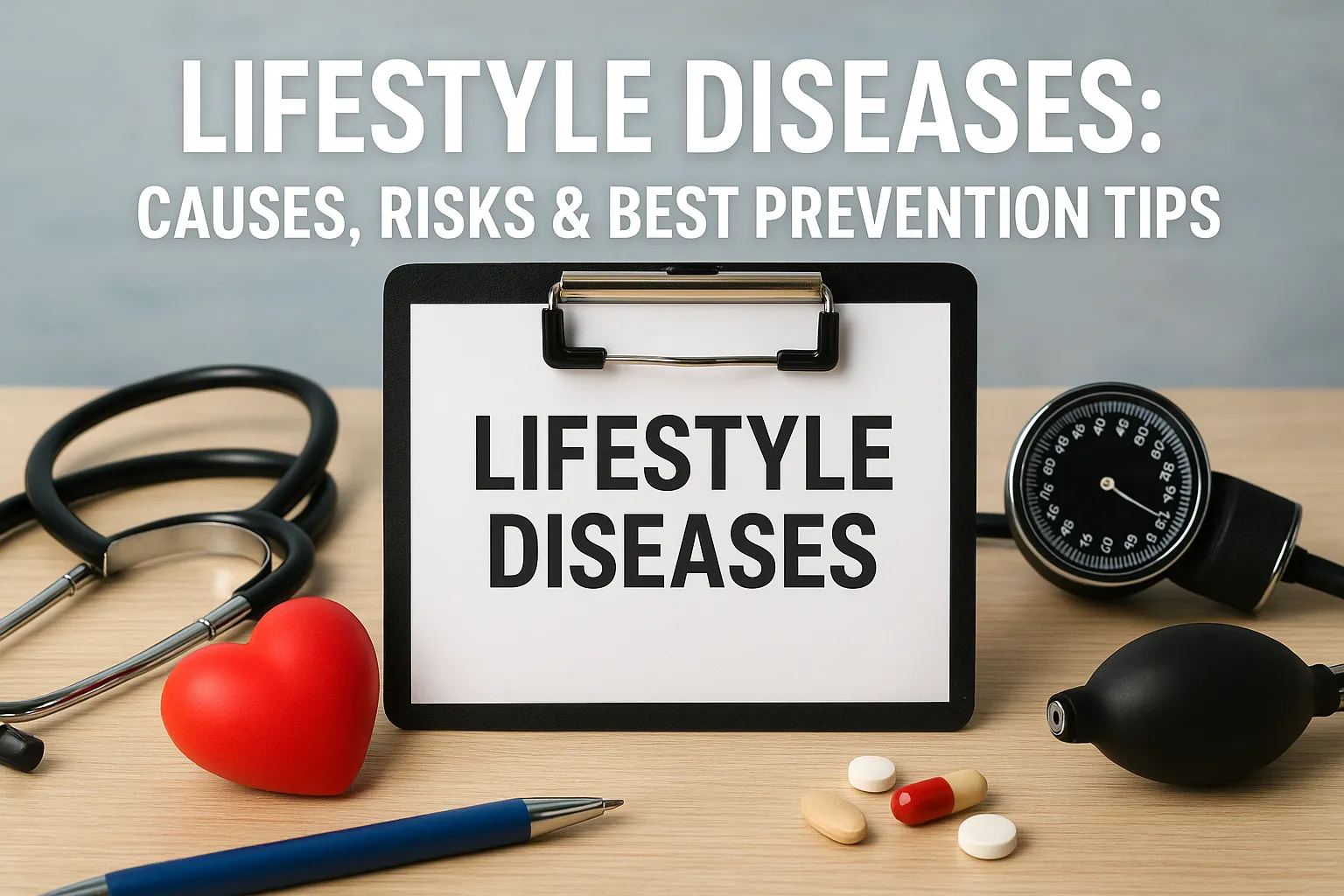Modern lifestyles fuel lifestyle diseases, or non-communicable diseases (NCDs), posing a major global health challenge. Conditions like heart disease, type 2 diabetes, and obesity stem from daily habits. Unlike infectious diseases, NCDs develop slowly and aren’t contagious. Urbanization, processed foods, and sedentary routines affect millions, straining healthcare systems. Consequently, this guide explores causes, risks, and practical prevention tips to help you improve your health.
Table of Contents

What Are Lifestyle Diseases?
Lifestyle diseases, also called NCDs, arise from habits, environment, and genetics. For example, they include heart disease, diabetes, obesity, and some cancers. By understanding their causes, you can take steps to lower your risk. Moreover, adopting healthy habits helps prevent these serious conditions. For related health insights, visit our guide on Nutrition Trends 2025: Science-Backed Diets.
What Causes Lifestyle Diseases?
Modern living drives lifestyle diseases. Specifically, urbanization, desk jobs, and unhealthy foods create a perfect storm. Here are the main causes:
- Unhealthy Diet: Processed foods, sugars, and unhealthy fats lack nutrients like fiber and vitamins. As a result, they cause weight gain and inflammation.
- Lack of Exercise: Sedentary habits increase risks of obesity and diabetes. Regular activity, however, supports heart health and blood sugar control.
- Smoking: Tobacco use triggers lung cancer and heart disease. Even secondhand smoke poses risks.
- Excessive Alcohol: Heavy drinking harms the liver and raises cancer risks. Moderation is key.
- Stress and Poor Sleep: Chronic stress and lack of sleep disrupt hormones, leading to inflammation and weak immunity.
- Pollution: Air toxins and pollutants increase respiratory and cancer risks.
Common Lifestyle Diseases and Risks
Lifestyle diseases bring serious health risks. Therefore, understanding them encourages proactive choices.
- Type 2 Diabetes: Insulin resistance causes high blood sugar. It leads to nerve damage, kidney issues, and heart risks.
- Heart Diseases: High blood pressure and strokes result from artery plaque buildup. Poor diet and inactivity worsen this.
- Obesity: Excess body fat increases diabetes and cancer risks. It also affects mobility and mental health.
- Respiratory Diseases: Smoking and pollution cause COPD and asthma.
- Cancers: Poor diet, smoking, and inactivity contribute to lung, breast, and colon cancers.
For exercise tips to reduce these risks, read our Top 10 Fat-Burning Exercises Backed by Science.
Best Prevention Tips for Your Health
Fortunately, you can prevent most lifestyle diseases with simple changes. These actionable tips boost your well-being:
- Eat Nutrient-Rich Foods: Choose fruits, vegetables, whole grains, and lean proteins. Avoid processed foods and sugary drinks.
- Stay Active: Aim for 150 minutes of moderate exercise, like walking or cycling, weekly. Additionally, include strength training twice a week. See Fitness for Beginners Over 40 for tailored advice.
- Maintain Healthy Weight: Balance diet and exercise to achieve a healthy BMI. Even small weight loss helps.
- Quit Smoking: Stopping tobacco use improves heart and lung health quickly.
- Manage Stress and Sleep: Practice yoga or meditation. Aim for 7-9 hours of sleep nightly.
- Limit Alcohol: Drink moderately—one drink daily for women, two for men.
- Get Regular Check-Ups: Screenings catch risks early, preventing serious issues.
Frequently Asked Questions (FAQ)
Q1: What are lifestyle diseases?
A: NCDs, like heart disease and diabetes, stem from unhealthy habits such as poor diet and smoking.
Q2: Are lifestyle diseases contagious?
A: No, they arise from habits and genetics, not person-to-person contact.
Q3: Can you cure lifestyle diseases?
A: Many are manageable with lifestyle changes. For instance, diet and exercise can control diabetes symptoms.
Q4: Is it too late to start healthy habits after 40?
A: Never. Small changes, like better diet, improve health at any age.
Q5: How do I prevent lifestyle diseases?
A: Eat well, exercise daily, sleep enough, and avoid smoking. Regular check-ups help too.
Conclusion
Lifestyle diseases threaten global health, but you can prevent them with smart choices. By tackling poor diet, inactivity, and stress, you lower NCD risks. Start today with small steps like eating vegetables or walking. For personalized plans, consult a healthcare expert. Also, if stress or nutrition affects hair health, explore Best Non-Surgical Hair Transplant Alternatives (2025–26).
Learn more about NCDs at the World Health Organization’s Non-Communicable Diseases page.
Disclaimer
This article offers educational information only, not medical advice. Consult a healthcare professional before changing your diet or exercise, especially with health conditions. The authors are not liable for any adverse effects from this information.


